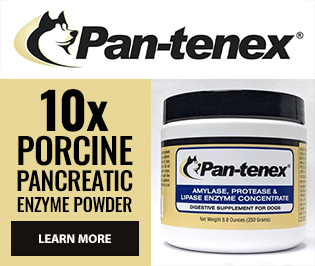As dogs age, their digestive systems can become less efficient. This often leads to changes in stool quality, appetite, weight, and nutrient absorption. One of the most effective ways to support a senior dog’s gut health is with the addition of digestive enzymes.
Digestive enzymes help break down fats, proteins, and carbohydrates before the food reaches your dog’s small intestine. For older dogs with declining pancreatic function or chronic digestive issues, enzyme supplementation may make a noticeable difference in comfort and overall well-being.
Why Digestion Changes as Dogs Age
The natural aging process affects every system in a dog’s body, including digestion. Senior dogs often experience a drop in enzyme production, leading to:
- Softer or looser stool
- Unexplained weight loss
- Flatulence or gassiness after meals
- Ravenous appetite with no weight gain
- Lack of interest in food
These symptoms are often mistaken for food sensitivities or aging itself, when in fact the root issue may be reduced digestive efficiency.
How Digestive Enzymes Help Senior Dogs
Digestive enzymes provide a way to “pre-digest” food before it enters the small intestine. This gives aging digestive systems the help they need without overtaxing the pancreas. A high-potency porcine enzyme like Pan-tenex offers a 10x concentration of lipase, protease, and amylase; ideal for dogs who may need enzyme replacement support as they age.
Many senior dog owners report noticeable improvement in stool firmness, energy, and appetite within the first few days of enzyme use. You can learn more about how long it takes to see results in this related article.
Making the Switch for Your Senior Dog
If your dog is new to enzymes, it’s best to start with a reduced dose and work up gradually. This gives their system time to adjust. You can find complete guidance in our article on introducing digestive enzymes for the first time.
The enzyme powder should be mixed into your dog’s moistened food and allowed to sit before feeding. Follow your enzyme product’s feeding instructions carefully. Pan-tenex offers a clear breakdown by meal size on our feeding guidelines page.
Tracking Digestive Improvement Over Time
Senior dogs may take a little longer to show results depending on their health and history. To stay on top of changes, we recommend using our printable Dog Enzyme Digestive Health Stool Tracker to monitor their stool quality, energy, and eating habits over the first few weeks.
Additional Gut Support for Older Dogs
While enzymes provide the foundation, older dogs may benefit from additional digestive support. Supplements like probiotics or B12 may be appropriate in certain cases. See our related articles:
- Do Dogs on Digestive Enzymes Also Need Probiotics?
- Should You Add B12 to Your Dog’s Diet?
- What Role Does Fiber Play in Dog Digestive Balance?
Talk to Your Vet First
Before starting any supplement, especially for senior dogs with existing conditions, talk to your veterinarian. Dosing can vary by product, meal size, and individual dog size. As with any supplement, enzymes should be used under professional guidance.
If you have questions about choosing the right enzyme or how to start your senior dog on digestive support, feel free to contact us.

